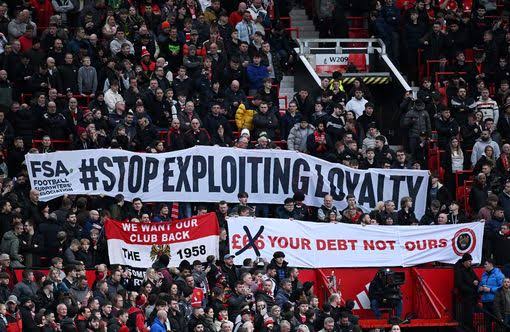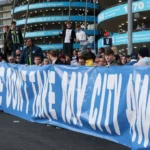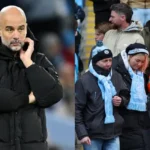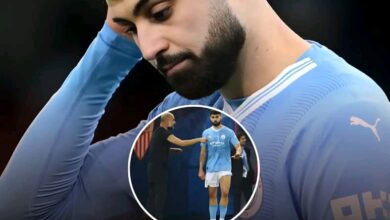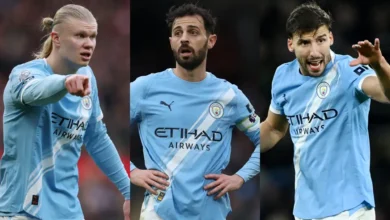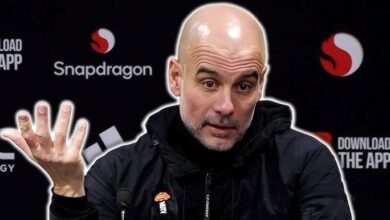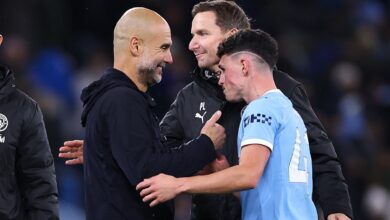Man City fans write open letter to Pep Guardiola and call on boss for ‘one more favour’ over season ticket availability and matchday pricing

In the glittering modern era of Manchester City Football Club, where trophies have become almost an annual certainty and historic achievements are routinely celebrated, a surprisingly discordant note has emerged from the club’s loyal supporter base. As the physical structure of the Etihad Stadium grows to accommodate the club’s expanding global profile, there’s a growing concern that the heart and soul of the club—its generational fan base—may be inadvertently squeezed out in the process.
In an unprecedented move that highlights the seriousness of their concerns, several prominent Manchester City fan groups have taken the extraordinary step of writing an open letter directly to manager Pep Guardiola, bypassing the traditional club hierarchy to appeal to the one figure they believe truly understands the symbiotic relationship between a passionate crowd and on-field success.
The Open Letter: A Heartfelt Appeal to the Architect of Success
The letter, authored collectively by fan groups 1894, MCFC Food Bank Support, Solid Citizens, and Trade Union Blues, strikes a deferential but determined tone. It begins by congratulating the Catalan manager on guiding the team to yet another Wembley final—a feat that has become almost commonplace during his tenure—before swiftly moving to its central concern: the growing economic barriers that threaten to disconnect the club from its traditional supporter base.
“Pep, congratulations on leading us to another Wembley final,” the letter begins, establishing both respect and a sense of shared celebration. “Before the Forest game you said you understood the fact that fans are facing economic pressures. We are glad you recognise this and you have said that you prefer the fanbase to be alive and not passive.”
This acknowledgment of Guardiola’s previous statements on the importance of an energetic crowd serves as both validation of their concerns and a subtle reminder to the manager of his own stated preferences. It’s a masterful rhetorical approach that aligns their interests before making their request:
“With this in mind we ask you for one more favour. Your friends at the club have done many good things. Can you ask them to do one more good thing? Can you speak with your good friend, club CEO Ferran Soriano.”
The appeal to Guardiola’s personal relationship with Soriano represents a sophisticated understanding of the club’s internal dynamics. It acknowledges the manager’s influence beyond tactical decisions and team selections, recognizing him as perhaps the most powerful individual within the club’s structure—someone whose voice carries weight even in commercial and strategic matters.
The North Stand Expansion: Opportunity and Threat
At the heart of the fans’ concerns is the ongoing expansion of the Etihad Stadium’s North Stand, which will increase capacity by approximately 8,000 seats for the upcoming season. This expansion represents both an opportunity and a potential threat in the eyes of supporter groups.
The opportunity is clear: more seats could mean greater accessibility and the chance to strengthen the club’s atmospheric core. The threat, however, is that these new seats might be allocated primarily to premium packages, corporate clients, or casual match-by-match supporters rather than being offered as traditional season tickets to the club’s most loyal fans.
“The stadium is growing by 8,000 next season and the fans want the club to bring back some real season tickets so that the generational links can be protected,” the letter continues, highlighting a trend that has concerned many long-term supporters. “The amount of season ticket holders in the stadium has been shrinking.”
This reduction in season ticket allocation represents more than just an inconvenience for individual fans. It strikes at something far more fundamental: the multi-generational connection that forms the emotional foundation of football support. When families can no longer count on consistent access to matches, the ritual of passing down club loyalty from grandparent to parent to child becomes endangered.
The fans also raise a pragmatic economic argument: “When fans cannot attend games the club then cannot resell those tickets because they are priced too high.” This observation points to a potentially self-defeating pricing strategy where maximum theoretical revenue may actually result in lower actual returns due to unsold inventory—an empty seat represents revenue lost forever.
Bridging Ambitions: The Club’s Global Vision and Local Roots
Manchester City’s transformation over the past decade and a half has been remarkable by any standard. From a club that had fallen to the third tier of English football in the late 1990s to becoming a global powerhouse that has redefined excellence in the Premier League era, City’s journey represents one of the most dramatic ascents in sporting history.
This transformation has been powered by the immense investment from the Abu Dhabi United Group, which acquired the club in 2008. Under Sheikh Mansour bin Zayed Al Nahyan’s ownership, City has evolved from an underachieving local institution into a global sports entertainment brand with commercial reach extending far beyond Manchester’s city limits.
The club’s expansionist vision extends beyond mere on-field success. The City Football Group now encompasses clubs across multiple continents, from New York to Melbourne, Yokohama to Mumbai. This global network reflects an ambition that transcends traditional notions of what a football club can be, reimagining it as a multinational entertainment enterprise with diversified revenue streams and worldwide appeal.
Yet this global vision inevitably creates tension with the club’s local identity and historic supporter base. The fans who weathered the lean years, who supported the club when relegation was more common than trophies, now find themselves navigating a transformed landscape where their beloved institution simultaneously belongs to them through emotional investment and to a global audience through commercial imperatives.
This tension is perfectly encapsulated in the letter’s appeal to shared interests: “We want the same things as you. A powerful club, with a loud atmosphere in the stadium. The North Stand redevelopment is a chance to make that happen. However, you will not get the atmosphere you crave if the club do not think again.”
It’s a subtle reminder that global success and local passion need not be mutually exclusive—indeed, they can be mutually reinforcing if properly balanced. The most compelling global sports brands maintain authentic connections to their origins, understanding that their worldwide appeal is often rooted in the passion and tradition of their home support.
The Guardiola Factor: More Than Just a Manager
The decision to appeal directly to Pep Guardiola rather than through conventional channels speaks volumes about his unique position within the club’s ecosystem. Since his arrival in 2016, Guardiola has transcended the traditional role of football manager to become something approaching a philosophical figurehead for the entire institution.
His influence extends far beyond team selection and tactics. Guardiola has repeatedly emphasized the importance of the club’s culture, its connection to the city of Manchester, and the critical role that passionate support plays in creating a successful environment. He has often spoken about his desire for a vibrant atmosphere at the Etihad Stadium, occasionally expressing frustration when he perceives a lack of energy from the stands.
This cultural authority gives Guardiola a unique platform from which to influence club policy, even in areas traditionally outside a manager’s remit. The fan groups clearly recognize this, appealing to him as someone who might bridge the gap between supporter concerns and boardroom decisions.
Guardiola’s own background may make him particularly receptive to such appeals. Having come through Barcelona’s La Masia academy to become both a playing legend and transformative manager at a club owned by its members, he understands the fundamental importance of a club maintaining authentic connections with its community and traditions, even while pursuing global ambitions.
The Economics of Modern Football: A Delicate Balance
The financial realities of elite modern football create genuine challenges for clubs attempting to balance competitive success with supporter accessibility. Player wages, transfer fees, and infrastructure costs have escalated dramatically over the past two decades, creating pressure to maximize revenue from all available sources—including ticket prices.
Manchester City’s most recent financial reports revealed annual revenue of approximately £613 million, making it one of the wealthiest clubs in world football. Yet this enormous turnover exists alongside substantial expenditure, with the club’s wage bill alone reportedly exceeding £350 million annually.
Against this backdrop, the marginal revenue increase from higher ticket prices may seem an irresistible opportunity. Yet this approach risks overlooking the less tangible but equally important asset of atmospheric intensity and authentic supporter culture—elements that enhance both the matchday experience and the global television product.
The fan groups make this economic case explicitly: “Surely the most important thing is to ensure there are no empty seats inside the Etihad Stadium. Make it easy for the fans to attend and you will get full attendance. This also means more revenue for the club as the fans spend more inside the stadium.”
This argument suggests a more sophisticated understanding of stadium economics than simply maximizing price per seat. Empty seats represent not only lost ticket revenue but also reduced spending on refreshments, merchandise, and other in-stadium purchases. Moreover, a full stadium with passionate support creates a television spectacle that enhances the club’s global brand value—potentially a far more significant long-term asset than marginal increases in match-by-match revenue.
The Wembley Warning Sign
The letter makes reference to a particularly troubling indicator of the current pricing problem: “City did not sell out their allocation at Wembley for a FA Cup semi-final showdown with Nottingham Forest, with the mounting costs of following the club home and away—as regular trips to the national stadium are made—considered to be impacting attendances.”
For a club of Manchester City’s stature and success, failing to sell out an allocation for a Wembley semi-final would have been unthinkable in previous eras. FA Cup semi-finals and finals have traditionally been among the most coveted tickets in English football, representing special occasions in the sporting calendar.
That some supporters chose not to attend such a prestigious fixture sends a powerful message about the cumulative financial burden of following the team. With City regularly reaching the latter stages of multiple competitions, loyal fans may face the prospect of multiple expensive trips to London within a short timeframe, in addition to their regular home and away commitments.
This situation highlights a paradox of success: the club’s remarkable achievements on the field—reaching numerous finals and later stages of cup competitions—have created an additional financial burden for the most dedicated supporters who wish to witness these historic moments in person.
The Broader Context: Football’s Affordability Crisis
Manchester City’s situation reflects a broader trend affecting English football and elite European clubs more generally. As the commercial value of football has soared—driven by lucrative broadcasting deals and growing global interest—ticket prices have frequently risen faster than inflation or wage growth, pricing out traditional supporter bases.
Premier League matches now routinely cost upwards of £50-60 for standard tickets, with premium seating substantially higher. For a family of four, attendance at a single match can easily exceed £200 before considering transportation, refreshments, and merchandise—placing regular attendance beyond the reach of many working-class fans.
This trend has sparked organized resistance across English football, with supporter groups at various clubs campaigning for more affordable access. Notable examples include Liverpool fans’ walkout protest over ticket prices in 2016 and the broader “Twenty’s Plenty” campaign, which advocates capping away ticket prices at £20.
The Manchester City fans’ appeal to Guardiola should be understood within this wider context of growing concern about football’s affordability and accessibility. Their approach—appealing directly to a figure of unquestioned authority within the club rather than engaging in more confrontational tactics—represents a distinctive strategy that acknowledges both the urgency of their concerns and the unique governance structure at the club.
The Generational Question: Football’s Future Audience
Perhaps the most compelling argument in the fan groups’ letter concerns the long-term implications of pricing policies for the club’s future supporter base: “The decisions the club make this summer could influence the way the stadium feels for many years to come.”
This statement recognizes that current pricing decisions will shape not just immediate attendance patterns but the demographic and cultural composition of Manchester City’s support for decades to come. When young fans are priced out of regular attendance, their connection to the club inevitably weakens compared to previous generations who could afford to attend regularly from childhood.
Research has consistently shown that early exposure to live football creates the strongest and most durable supporter bonds. Fans who regularly attend matches in childhood and adolescence typically maintain lifelong club affiliations and are more likely to pass that allegiance to their own children, creating the multigenerational support base that gives clubs their cultural continuity.
By contrast, fans whose primary connection comes through television or occasional premium-priced “special occasion” visits may develop different, potentially less durable relationships with the club. This raises profound questions about the long-term cultural identity of clubs that prioritize maximizing short-term revenue over nurturing the next generation of devoted supporters.
Stadium Atmosphere: The Intangible Asset
The letter’s emphasis on creating “a powerful club, with a loud atmosphere in the stadium” highlights an often undervalued asset in modern football: the distinctive matchday experience created by passionate, engaged supporters.
In an era when most football consumption occurs via television or streaming services, the atmospheric quality of the in-stadium experience becomes a key differentiator in the global broadcast product. Clubs with reputations for exceptional atmosphere—like Borussia Dortmund’s famous “Yellow Wall” or Liverpool’s Kop End—derive significant brand value and viewer appeal from these distinctive supporter cultures.
Manchester City’s Etihad Stadium has sometimes faced criticism for lacking the atmospheric intensity of other venues, earning the derisive nickname “the Emptyhad” from rival supporters. While often unfair and exaggerated, these perceptions highlight the importance of cultivating an engaged, vocal supporter culture—something the letter suggests could be enhanced through more accessible season ticket allocations in the expanded North Stand.
The fans’ argument that Guardiola himself wants and needs this atmosphere (“you will not get the atmosphere you crave”) cleverly aligns their interests with his own stated preferences. It presents ticket pricing not merely as a commercial decision but as one with direct sporting implications—the kind of consideration that would naturally concern the manager.
Looking Forward: Balancing Commercial Growth and Cultural Authenticity
As Manchester City continues its evolution into a global sporting institution, the challenge of balancing commercial imperatives with cultural authenticity will only intensify. The club’s leadership faces genuine strategic questions about how to grow revenue while preserving the distinctive character that makes the club appealing in the first place.
The fan groups’ letter concludes with a simple expression of gratitude: “Thank you Pep once again for listening to the fans.” This modest closing belies the profound importance of the conversation they’re attempting to initiate—one that could help define Manchester City’s identity for generations to come.
Whether Guardiola chooses to act on this appeal remains to be seen. As someone who has consistently emphasized the importance of football’s human connections and cultural meaning, he may well be sympathetic to the fans’ concerns. Yet he also operates within a complex institutional structure with multiple stakeholders and competing priorities.
What seems certain is that Manchester City, like all elite clubs in the modern era, must find ways to grow commercially without severing the authentic connections that give the club its soul. The North Stand expansion represents both a challenge and an opportunity in this regard—a chance to create a larger, more imposing home venue while also strengthening the club’s bonds with its most dedicated supporters.
As the letter eloquently puts it: “The decisions the club make this summer could influence the way the stadium feels for many years to come.” In this simple observation lies a profound truth about modern football: that the game’s financial future and cultural legacy are inextricably linked, each dependent on the other for true, sustainable success.
The Legacy Question for Guardiola and City’s Leadership
As Pep Guardiola contemplates his response to this heartfelt appeal from supporter groups, he may also be considering his own legacy at Manchester City. Having achieved unprecedented on-field success, cementing the club’s status as a dominant force in English and European football, his influence on matters beyond tactics and training could form an equally important part of his enduring impact.
By advocating for accessible ticket pricing and prioritizing the preservation of the club’s traditional supporter culture, Guardiola could help ensure that the remarkable era of success he has orchestrated remains celebrated not just for trophies won but for the inclusive community it fostered. This would align with his frequently expressed philosophy that football derives its ultimate meaning from its connection to ordinary people and their lives.
For City’s ownership and executive leadership, the challenge is similarly profound. Having transformed the club’s competitive standing, infrastructure, and global profile, they now face the more subtle task of nurturing its soul—the intangible but essential quality that transforms a successful sports enterprise into a beloved institution that transcends generations.
The expansion of the Etihad Stadium offers a perfect opportunity to demonstrate commitment to this balancing act. By ensuring that a significant portion of the new capacity is allocated to affordable season tickets, the club could make a powerful statement about its values and long-term vision—one that recognizes commercial growth and cultural authenticity as complementary rather than competing priorities.
As Manchester City continues writing its remarkable modern history, the dialogue between supporters, management, and ownership will shape not just ticket prices but the very character of the institution. The fans’ appeal to Guardiola represents a thoughtful contribution to this ongoing conversation—one that deserves serious consideration from all who care about the club’s future.
